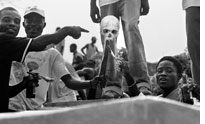Liberia Recovers From War
MONROVIA, Liberia—There is a time to mourn and a time to dance. So says Ecclesiastes. It's a passage people cite often in Liberia, where salvation is sought with the hunger of the famine-stricken. But on a recent March morning in a graveyard in downtown Monrovia, Ecclesiastes seemed a dubious guide to reality. A group of young people danced on a tomb to ear-splitting hip-hop, tipping back bottles of beer, and a man with dreadlocks brandished a human skull on a stake. He said the skull belonged to Uncle Sam. "One day you will be like him, too," he yelled to me. "I wish you could be my wife!"
Nearby, Abraham George, a 32-year-old theology student, offered the opposite view. "Today is a day to remember people who were taking care of you, and they died," he said, struggling to make his voice heard above the music. "It's not a day to be happy. It's a day to be sad."
It was Decoration Day, a national holiday whose meaning I was struggling to unravel. I had been in Liberia about two and a half weeks, long enough to have heard Chapter 3 of Ecclesiastes on the lips of preachers and politicians for whom it has become a useful shorthand for talking about the country's transition from war to peace. "To every thing there is a season, and a time to every purpose under heaven," the King James Version begins. "A time to be born and a time to die; a time to plant and a time to pluck up that which is planted. A time to kill and a time to heal; a time to break down and a time to build up." Liberia's 14-year civil war ended in 2003, leaving at least 250,000 dead in a country of 3 million. Today, 14,000 U.N. peacekeepers patrol, and the government is trying to revive the ruined economy, rebuild roads, and restore electricity. This, everyone says, is Liberia's time to heal.
But such transitions are rarely as simple as the Bible makes them sound. On Decoration Day, mourning and dancing were simultaneous and sometimes indistinguishable, reminding me of jazz funerals in New Orleans. The graves look like New Orleans' too: raised, whitewashed stone tombs, an echo of the American South in a country founded by freed slaves. In America, Memorial Day was originally called Decoration Day, and freed blacks are said to have been among the first to celebrate it as a way of honoring the Union dead after the Civil War. In Liberia, people troop to the graveyards to clean and paint the tombs, sometimes adding inscriptions from the Bible or a drawing of the hand of Jesus.
A few days earlier, I had met some of the graveyard's living residents. Since the war, Monrovia's Center Street cemetery has become home to a desperate community of pickpockets and petty thieves, prostitutes and ex-combatants, who gave up their weapons but haven't found a legal way to survive. Some are addicted to crack cocaine, especially the former fighters, who got hooked when they were given drugs to make them brave in battle. They sleep on the tombs and sometimes inside them, removing the human remains or pushing the bones aside. Police raid the graveyard regularly, beating people and chasing them away, but they keep coming back. They say they have nowhere else to go.
There is a time to be born and a time to die—but what can be said about a country where the living usurp the resting places of the dead? Ecclesiastes glosses over a key reality: War disrupted every aspect of life here. Death is not an abstraction but something that people know intimately, like the pressure of the sun on covered heads or the unpredictable music of water coursing through old pipes, which sends women running with buckets. The war gave rise to many reversals. Drugged, heavily armed children overpowered adults, and peace sometimes feels as unnatural as conflict, as if people are simply marking time until the fighting starts up again
As I walked deeper into the cemetery, even Liberia's fervid Christianity seemed to loosen its grip. A medicine man wandered amid the graves, his face smeared with a thick chalk paste that he said enabled him to see invisible enemies. People smoked pot under the banyan trees, and groups of boys drummed and danced ecstatically, drunk on cane juice and gin.
Near the large, freshly painted grave of his mother and sister, Joseph Mason poured palm wine on the ground and asked their spirits to bless him. A man standing nearby explained that the dead are wiser than the living and more powerful. He translated Mason's words, spoken in one of Liberia's indigenous tongues: "We do not know actually what is going on, so help us with our money, with any work that our hand is touching. And let us live peacefully."
